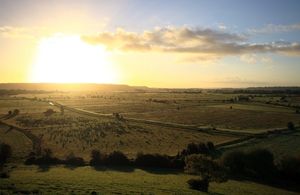New ‘super’ National Nature Reserve created to protect rare wildlife
The new National Nature Reserve will protect 6,140 hectares of precious saltmarsh, heath and wetland habitats, home to nationally significant wildlife populations.

A vast new ‘super nature reserve’, spanning large parts of Somerset and encompassing some of the country’s most precious habitats, has been created today (19th May).
The declaration of the new Somerset Wetlands ‘super’ National Nature Reserve (NNR) by Natural England and partners will protect 6,140 hectares of precious saltmarsh, heath and wetland habitats, home to nationally significant wildlife populations.
The area is a stronghold for many different species of wetland and ground nesting birds like the Skylark, Bittern and Avocet. It is also a significant site for a huge variety of insects such as the hairy dragonfly, silver diving beetle and the raft spider – the second largest spider in the UK.
With the increasing need for a bigger, better and more joined-up approach to nature conservation, today’s announcement is an important moment for nature recovery. The site will knit together a total of six nature reserves and other nature managed land in the Somerset Levels, Coast and Moors and will join England’s developing Nature Recovery Network.
Tony Juniper, Chair of Natural England, said:
The creation of this very large National Nature Reserve is an important moment for Nature recovery in England. This is not least because it presents a practical demonstration of what can be done by working in partnership across the landscape at scale to reverse Nature’s decline. Natural England intends to encourage other projects with similar ambition.
Seventy years from the creation of our first National Nature Reserves in England these wonderful places are needed now more than ever, as we face into the challenges of global warming, wildlife decline and reconnecting people with the natural world.
Environment Minister Rebecca Pow said:
Today is a landmark moment for nature recovery in Somerset. A new super National Nature Reserve will not only protect wildlife and help tackle climate change by restoring peatlands and improving habitats, it will provide people with greater opportunities to visit these beautiful wetlands with consequent spin offs that will benefit the local economy too.
And crucially, this vast project will play an important part in reversing the decline in nature through our Nature Recovery Network, as set out in our ambitious Environment Act.
Rosie Hails, Director of Nature and Science at the National Trust, said:
The huge challenge posed by the twin climate and nature crises is such that ambitious solutions are urgently needed at scale. The launch of a new Super National Nature Reserve represents a significant step forward in working across boundaries to address the most pressing environmental issues while, crucially, bringing nature closer to people.
We’re proud to care for national nature reserves across the country, and the making of a new ‘Super’ reserve is a fitting way to mark 70 years since the first designation. Today, the creation and protection of space for wildlife to thrive couldn’t be more important.
Craig Bennett, Chief Executive, The Wildlife Trusts said:
Working across whole landscapes is essential to tackling the twin nature and climate crises. Super National Nature Reserves provide a great opportunity to engage a wide range of people, including private landowners, to tackle some of the issues affecting our nature reserves that need action to be taken at a landscape scale.
If we are to achieve nature’s recovery, we need to create and restore wild places across the countryside, giving wildlife the chance it so desperately needs to spread and thrive. Natural solutions such wetlands and peat bogs which store carbon are crucial for a healthier future. From booming bittern to red squirrels, wildflower-rich meadows and dramatic coastlines, we’re proud that Wildlife Trusts in England care for a massive 53 National Nature Reserves – arguably our best places for people to enjoy nature.
We welcome today’s announcement which we hope will enable more strategic management of land for wildlife, and we’re looking forward to celebrating the Festival of National Nature Reserves.
The announcement today demonstrates how the Government is delivering on the Environment Act – a key target laid out in Act is to halt the decline in our wildlife populations through a legally binding target for species abundance by 2030.
The local tourism industry and residents are also set to benefit from this declaration, which will provide more people with access to nature by making it easier for residents of local towns such as Bridgwater and Glastonbury to access the sites, as well as improving the health and wellbeing of the local community and provide economic benefits through developing wildlife tourism opportunities.
The declaration today is at the centre of celebrations for the 70th anniversary of the creation of England’s first nature reserve on 19 May 1952. Today there are 219 sites, spanning 101,531ha. These ‘nature hotspots’ are key to restoring nature across England and helping to bring green space and wildlife to everyone, including those who live in towns and cities.
There will be a ‘Festival of Nature Reserves’ this summer to celebrate with a programme of events at nature reserves. To find out more about the festival and how to get involved in events across the country, visit http://www.nnrfestival.com/